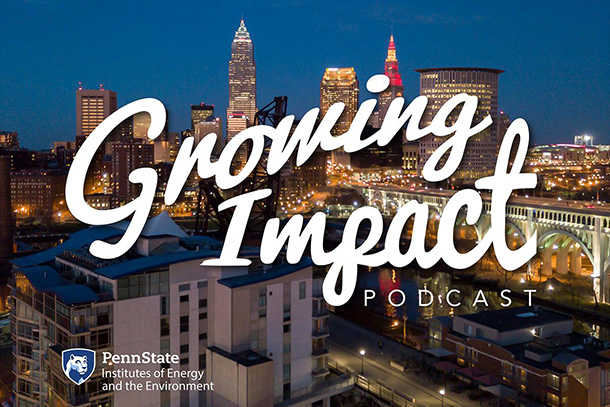
Two researchers are investigating what an energy transition could look like in Cleveland, a city with substantial segregation, many low-income people and a large rental housing community. Photo Credit: Brenna Buck
'Growing Impact' podcast examines relationship between housing, energy, justice
August 1, 2022
Editor's note: This article originally appeared on Penn State News. Esther Obonyo, associate professor of engineering design and architectural engineering and director of the Global Building Network, is featured.
UNIVERSITY PARK, Pa. — The latest episode of the Growing Impact podcast features Emily Rosenman, an assistant professor in the Department of Geography in the College of Earth and Mineral Sciences. Rosenman is an urban and economic geographer who researches the connections between finance, urbanization and inequality. On the podcast, she discusses her seed grant project, "Energy Retrofit Policy and Programs in Low-Income Housing Markets: Implications for Energy Equity in Cleveland, Ohio."
Rosenman and her collaborator Esther Obonyo, director of the Global Building Network and associate professor of engineering design and architectural engineering, are investigating what an energy transition could look like in a city with substantial segregation, many low-income people and a large rental housing community. The researchers’ larger goal is to understand what types of technology and societal changes would be needed to see an equitable energy transformation in the city that provides stable, affordable housing for all.
“As the impacts of the climate crisis are starting to unfold all around us, I don't think it's possible not to see the connections between energy, environment and social justice,” Rosenman said. “The fact that we have, in many ways, ignored the social justice aspects of how we power our lives and what we think is essential to live with is what got us into this mess to begin with.”
Rosenman said in her role as a social scientist, she has seen a lot of natural scientists increasingly recognizing the urgency of the climate crisis and becoming more engaged in social justice debates.
“Climate change is a scientific problem, but it is also a political problem,” she said, adding that the connection between affordable housing and energy is the theory that if you lower energy costs, housing costs should follow suit. In societies that treat housing as a commodity and prioritize property ownership, however, the complexities of the system create challenges to keeping housing affordable.
The challenges compound when cities and communities look to decarbonize existing buildings or construct new structures that are environmentally friendly and socially just, according to Rosenman.
Growing Impact is a podcast by the Institutes of Energy and the Environment (IEE). It features Penn State researchers who have been awarded IEE seed grants and discusses their foundational work as they further their projects. The podcast is available on multiple platforms, including Apple, Google, Amazon and Spotify.



